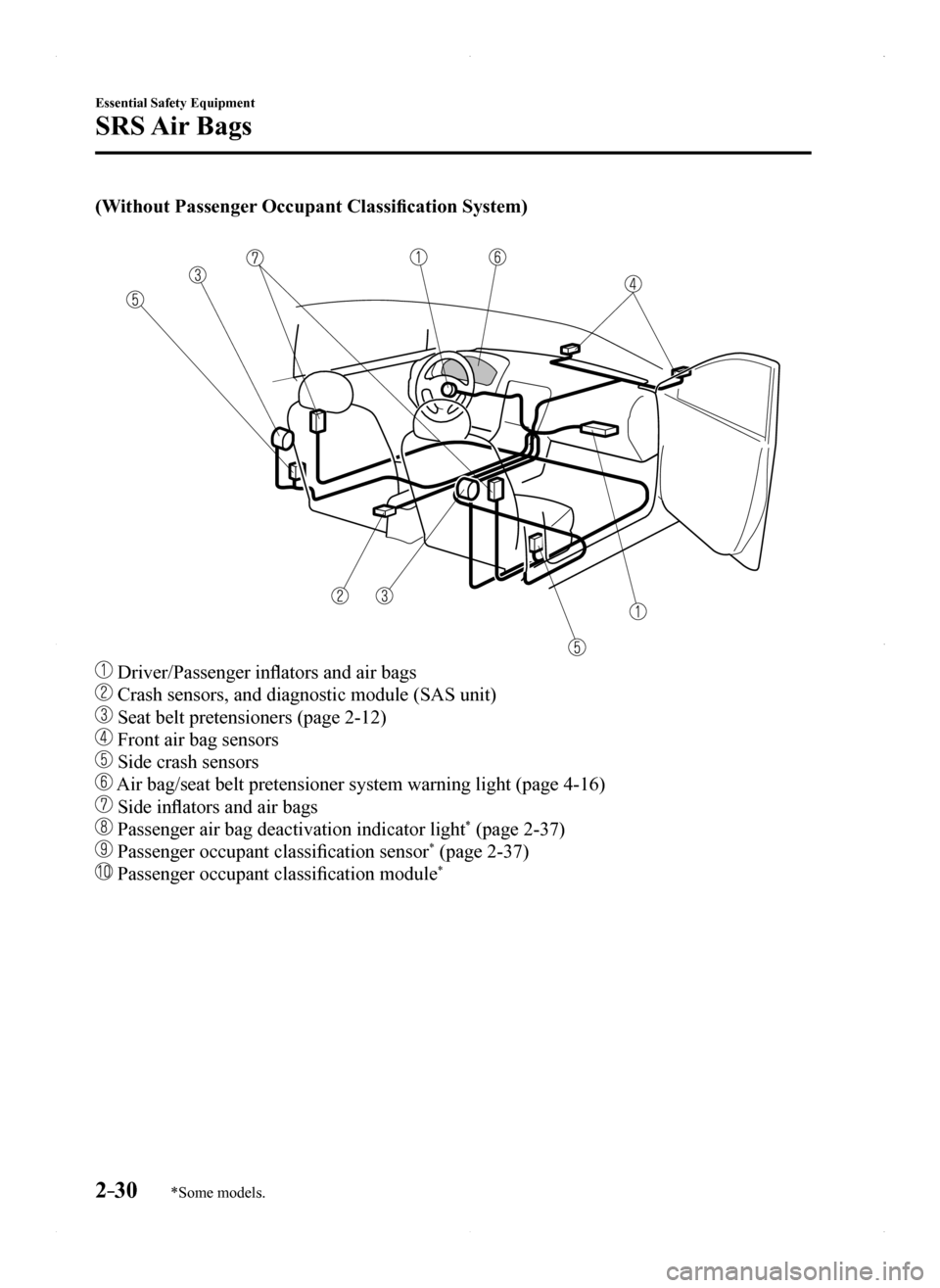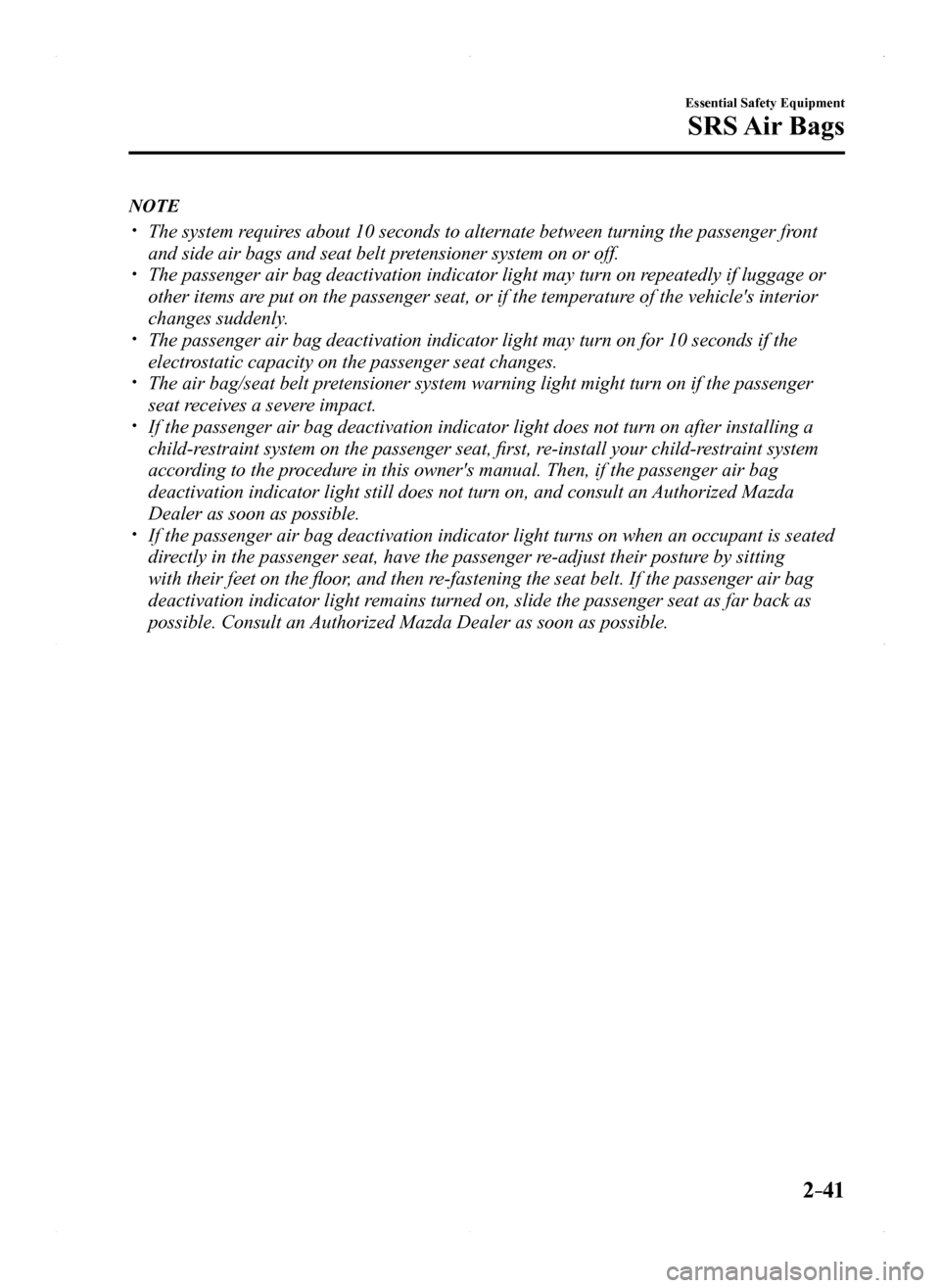2016 MAZDA MODEL MX-5 warning
[x] Cancel search: warningPage 37 of 526

2–25
Essential Safety Equipment
SRS Air Bags
Small children must be protected by a child-restraint system as stipulat\
ed by law in every
state and province. In certain states and provinces, larger children must use a child-restraint
system (page 2-15).
Carefully consider which child-restraint system is necessary for your ch\
ild and follow
the installation directions in this Owner's Manual as well as the child-\
restraint system
manufacturer's instructions.
Do not use a child-restraint system which employs an upper tether becaus\
e there is no
appropriate means to anchor the tether.
WARNING
Seat belts must be worn in air bag equipped vehicles:
Depending only on the air bags for protection during an accident is dangerous. Alone, air
bags may not prevent serious injuries. The appropriate air bags can be expected to inflate
only in the first accident, such as frontal, near frontal or side collisions that are at least
moderate. Vehicle occupants should always wear seat belts.
Always make sure the passenger air bag deactivation indicator light is illuminated
when using a child-restraint system (With Passenger Occupant Classification System):
Seating a child in a child-restraint system that is installed on the passenger seat with the
passenger air bag deactivation indicator light not illuminated is extremely dangerous. In
an accident, an air bag could inflate and cause serious injuries or even death to the child
seated in the child-restraint system. Always make sure the passenger air bag deactivation
indicator light is illuminated.
Refer to Occupant Classification System on page 2-37.
Do not sit too close to the driver and passenger air bags:
Sitting too close to the driver and passenger air bag modules or placing hands or feet on
them is extremely dangerous. The driver and passenger air bags inflate with great force
and speed. Serious injuries could occur if someone is too close. The driver should always
hold onto only the rim of the steering wheel. The passenger should keep both feet on
the floor. Seat occupants should adjust their seats as far back as possible and always sit
upright against the seatbacks with seat belts worn properly.
Do not sit too close to a door or lean against doors in vehicles with side air bags:
Sitting too close to the side air bag modules or placing hands on them is extremely
dangerous. A side air bag inflates with great force and speed directly out of the outboard
shoulder of the seat and expands along the door on the side the car is hit. Serious injury
could occur if someone is sitting too close to the door or leaning against a window in the
seats. Furthermore, sleeping up against the door or hanging out the driver-side window
while driving could block the side air bag and eliminate the advantages of supplemental
protection. Give the side air bags room to work by sitting in the center of the seat while
the vehicle is moving with seat belts worn properly.
MX-5_8EU4-EA-15D_Edition1.indb 252015/03/10 9:54:32
Page 40 of 526

2–28
Essential Safety Equipment
SRS Air Bags
Properly dispose of the air bag system:
Improper disposal of an air bag or a vehicle with live air bags in it can be extremely
dangerous. Unless all safety procedures are followed, injury could result. Have an
Authorized Mazda Dealer safely dispose of the air bag system or scrap an air bag
equipped vehicle.
NOTE
If it becomes necessary to have the components or wiring system for the \
supplementary
restraint system modified to accommodate a person with certain medical conditions in
accordance with a certified physician, contact an Authorized Mazda Dealer, refer to
“Customer Assistance (U.S.A.)” (page 8-2). When an air bag deploys, a loud inflation noise can be heard and some smoke will be
released. Neither is likely to cause injury, however, the texture of the air bags may cause
light skin injuries on body parts not covered with clothing through friction. Should you sell your Mazda, we urge you to tell the new owner of its air bag systems
and that familiarization with all instructions about them, from the Owner's Manual, is
important. (Except Mexico)
Vehicles with a passenger air bag have a warning label attached as shown \
below. This
warning label is displayed in compliance with regulations.
(Mexico)
Vehicles with a passenger air bag have a warning label attached as shown \
below.
This warning label reminds you not to put a rear-facing child-restraint system on the
passenger seat at any time.
MX-5_8EU4-EA-15D_Edition1.indb 282015/03/10 9:54:33
Page 42 of 526

2–30
Essential Safety Equipment
SRS Air Bags
*Some models.
(Without Passenger Occupant Classification System)
Driver/Passenger inflators and air bags
Crash sensors, and diagnostic module (SAS unit)
Seat belt pretensioners (page 2-12)
Front air bag sensors
Side crash sensors
Air bag/seat belt pretensioner system warning light (page 4-16)
Side inflators and air bags
Passenger air bag deactivation indicator light* (page 2-37)
Passenger occupant classification sensor* (page 2-37)
Passenger occupant classification module*
MX-5_8EU4-EA-15D_Edition1.indb 302015/03/10 9:54:33
Page 45 of 526

2–33
Essential Safety Equipment
SRS Air Bags
(With Passenger Occupant Classification System)
In addition, the passenger side bag is designed to only deploy when the \
passenger occupant
classification sensor detects a passenger sitting on the passenger's seat. For details, refer to
the passenger occupant classification system (page 2-37).
Warning Light/Beep
A system malfunction or operation conditions are indicated by a warning.
Refer to Warning/Indicator Lights on page 4-16.
Refer to Warning Sound is Activated on page 7-45.
MX-5_8EU4-EA-15D_Edition1.indb 332015/03/10 9:54:34
Page 49 of 526

2–37
Essential Safety Equipment
SRS Air Bags
*Some models.
Passenger Occupant Classification System*
First, please read "Supplemental Restraint System (SRS) Precautions" (\
page 2-24)
carefully.
Passenger Occupant Classification Sensor
Your vehicle is equipped with a passenger occupant classification sensor as a part of the
supplemental restraint system. This sensor is equipped in the passenger's seat cushion. This
sensor measures the electrostatic capacity of the passenger's seat. The SAS unit is designed
to prevent the passenger front and side air bags and seat belt pretensio\
ner system from
deploying if the passenger air bag deactivation indicator light turns on\
.
To reduce the chance of injuries caused by deployment of the passenger ai\
r bag, the system
deactivates the passenger front and side air bags and also the seat belt\
pretensioner system
when the passenger air bag deactivation indicator light turns on. Refer \
to the following table
for the passenger air bag deactivation indicator light illumination cond\
itions.
This system shuts off the passenger front and side air bags and seat belt pretensioner syste\
m,
so make sure the passenger air bag deactivation indicator light turns on\
according to the
following table.
The air bag/seat belt pretensioner system warning light flashes and the passenger air bag
deactivation indicator light illuminates if the sensors have a possible \
malfunction. If this
happens, the passenger front and side air bags and seat belt pretensione\
r system will not
deploy.
Passenger air bag deactivation indicator light
This indicator light turns on to remind you that the passenger front and\
side air bags and seat
belt pretensioner will not deploy during a collision.
MX-5_8EU4-EA-15D_Edition1.indb 372015/03/10 9:54:35
Page 51 of 526

2–39
Essential Safety Equipment
SRS Air Bags
WARNING
Do not allow an occupant in the passenger's seat to sit with a posture which makes
it difficult for the passenger occupant classification sensor to detect the occupant
correctly:
Sitting in the passenger's seat with a posture which makes it difficult for the passenger
occupant classification sensor to detect the occupant correctly is dangerous. If the
passenger occupant classification sensor cannot detect the occupant sitting on the
passenger's seat correctly, the passenger front and side air bags and pretensioner system
may not operate (deploy) or they may operate (deploy) accidentally. The passenger
will not have the supplementary protection of the air bags or the accidental operation
(deployment) of the air bags could result in serious injury or death.
Under the following conditions, the passenger occupant classification sensor cannot
detect a passenger sitting on the passenger's seat correctly and the deployment/non-
deployment of the air bags cannot be controlled as indicated in the passenger air bag
deactivation indicator light on/off condition chart. For example:
A passenger is seated as shown in the following figure:
MX-5_8EU4-EA-15D_Edition1.indb 392015/03/10 9:54:35
Page 53 of 526

2–41
Essential Safety Equipment
SRS Air Bags
NOTE
The system requires about 10 seconds to alternate between turning the passenger front
and side air bags and seat belt pretensioner system on or off. The passenger air bag deactivation indicator light may turn on repeatedly if luggage or
other items are put on the passenger seat, or if the temperature of the vehicle's interior
changes suddenly. The passenger air bag deactivation indicator light may turn on for 10 se\
conds if the
electrostatic capacity on the passenger seat changes. The air bag/seat belt pretensioner system warning light might turn on if the passenger
seat receives a severe impact. If the passenger air bag deactivation indicator light does not turn on a\
fter installing a
child-restraint system on the passenger seat, first, re-install your child-restraint system
according to the procedure in this owner's manual. Then, if the passenger air bag
deactivation indicator light still does not turn on, and consult an Authorized Mazda
Dealer as soon as possible. If the passenger air bag deactivation indicator light turns on when an o\
ccupant is seated
directly in the passenger seat, have the passenger re-adjust their posture by sitting
with their feet on the floor, and then re-fastening the seat belt. If the passenger air bag
deactivation indicator light remains turned on, slide the passenger seat as far back as
possible. Consult an Authorized Mazda Dealer as soon as possible.
MX-5_8EU4-EA-15D_Edition1.indb 412015/03/10 9:54:35
Page 54 of 526

2–42
Essential Safety Equipment
SRS Air Bags
Constant Monitoring
The following components of the air bag systems are monitored by a diagn\
ostic system:
Crash sensors, and diagnostic module (SAS unit) Front air bag sensors Air bag modules Side crash sensors Air bag/Seat belt pretensioner system warning light Seat belt pretensioners Related wiring
(With Passenger Occupant Classification System)
Passenger air bag deactivation indicator light Passenger occupant classification sensor Passenger occupant classification module
The diagnostic module continuously monitors the system's readiness. This begins when the
ignition is switched ON and continues while the vehicle is being driven.
MX-5_8EU4-EA-15D_Edition1.indb 422015/03/10 9:54:35